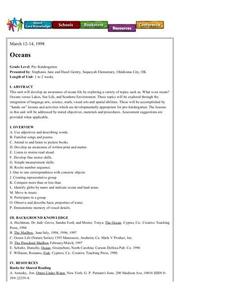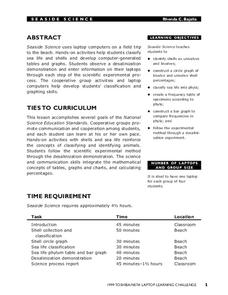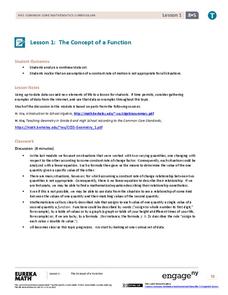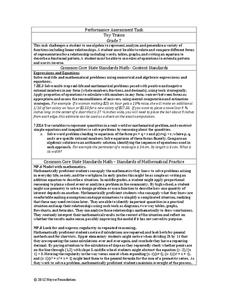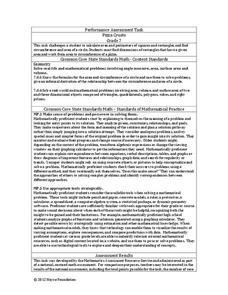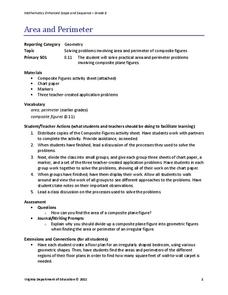Curated OER
Oceans
Students become aware of the differences between ocean water and lake water by smelling, tasting and seeing. They distinguish between land and bodies of water on a globe and gain increased awareness of oceans and life.
Curated OER
Codebreaker Math
Students solve addition and subtraction problems and decipher and write messages using a code. They read and discuss an informational fact sheet about the Navajo code talkers from World War II, and decode and re-code messages using math...
Curated OER
A Day in the Life
Students inquire about the politics and culture of Ancient Rome. In this Ancient Rome project/unit, students research life during ancient Roman times and create a newspaper with articles on politics, sports, culture, and economics.
Curated OER
Sea Animal Slide Show
Students cllassify sea animals into groups based on certain attributes. They create a picture on ClarisWorks for Kids. They write/wordprocess their own name and copy words from immediate environment to label sea animals.
Curated OER
Seaside Science
Students research sea life using laptop computers. In this sea life lesson plan, students participate in a field trip to the beach and enter observations into their laptop computers. Students classify shells and sea life.
Curated OER
The Great Cookie Company
Fourth graders implement real life application of money, problem solving, economics, and consumer awareness. In this three week economics unit, 4th graders operate a business, write checks, balance accounts, and market their product.
Curated OER
Maps- Looking at Map Scales
In this map scale worksheet, learners examine how to convert measurements on a map. They read 5 examples before completing 8 multi-step conversion problems. They insert the answers in an online version of the worksheet to determine if...
Alabama Learning Exchange
Making and Observing Life in a Terrarium
Young scholars understand the parts of the terrarium and why they are important in establishing an ecosystem. In this ecosystem lesson, students recall background information on aquariums, terrariums and the water cycle. Young scholars...
Curated OER
Beach Cleanup at a Local Beach
Students participate in an environmental clean-up activity. In this environmental lesson, students travel to a local beach. Working in small teams, students collect trash from the local beach. Returning to school, students sort the trash...
Curated OER
Dolphins
Students explore sea life. In this cross curriculum fine arts, science, and P.E. "dolphins" lesson, students sing songs and play games about dolphins, perform water experiments, create mosaics, and use their five senses to explore sand...
Curated OER
Plot Your Course
High schoolers determine distance and direction on a nautical chart. In this nautical instructional activity, students identify obstacles and characteristics of common aid to navigation on a nautical chart.
Curated OER
Percents: What's the Use?
Learners explore percentages in real world situations. In this percents lesson, students determine the final sales price after discounts. Learners interview community members and determine how percentages are used in the real world.
Curated OER
Introduction to Hours & Minutes
First graders identify, interpret, and gain proficiency in using a clock to tell time to the hour and determine how many minutes are in an hour. They identify and list what they do as they travel through their dayand how much time you...
Curated OER
Is the Hudson River Too Salty to Drink?
Students explore reasons for varied salinity in bodies of water. In this geographical inquiry lesson, students use a variety of visual and written information including maps, data tables, and graphs, to form a hypothesis as to why the...
Curated OER
Map Adventures
Students explore the relationship between a scale drawing and actual distance. For this mapping lesson, students use an amusement park map to determine distances and what they would be like in real life.
Curated OER
Latitude and Longitude
In this latitude and longitude worksheet, students complete 4 activities to demonstrate understanding. Students use a protractor to measure angles on a map of the earth. Students fill out a latitude and longitude chart after studying a...
Curated OER
Horseshoe Crab Fun
Marine biology masters will meet the horseshoe crab and red knot shore birds that feast upon the crab eggs. Begin with a discussion and then have learners write postcards from each animal detailing their migration trips. A few math...
Lane Community College
Review Sheets: Introductory Physical Science
This hybrid worksheet connects mathematics to a science class. Learners practice solving problems that involve making a variety of conversions. An assortment of questions hits all the calculations needed for a middle school or beginning...
EngageNY
The Concept of a Function
Explore functions with non-constant rates of change. The first installment of a 12-part module teaches young mathematicians about the concept of a function. They investigate instances where functions do not have a constant rate of change.
Perkins School for the Blind
Student Store
Vocational training activities are extremely important for learners with intellectual or physical disabilities. Here is a great idea that will help your class become skilled at money handling, basic economic concepts, interpersonal...
Noyce Foundation
Toy Trains
Scholars identify and continue the numerical pattern for the number of wheels on a train. Using the established pattern and its inverse, they determine whether a number of wheels is possible. Pupils finish by developing an algebraic...
Noyce Foundation
Pizza Crusts
Enough stuffed crust to go around. Pupils calculate the area and perimeter of a variety of pizza shapes, including rectangular and circular. Individuals design rectangular pizzas with a given area to maximize the amount of crust and do...
Virginia Department of Education
Area and Perimeter
Develop a strategy for finding the area and perimeter of irregular figures. Building on an understanding of finding area and perimeter of rectangles and triangles, learners apply the same concepts to composite figures. After practicing...
Inside Mathematics
Quadratic (2006)
Most problems can be solved using more than one method. A worksheet includes just nine questions but many more ways to solve each. Scholars must graph, solve, and justify quadratic problems.


